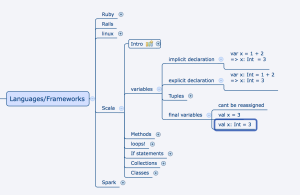File that under “inspirational.” Last year I went to my company’s yearly hackathon for the first time. I was in the middle of my internship and too intimidated to compete. Instead of doing a project, I drank beer with engineers who were doing something with Drones and Slack and prayed they didn’t ask me to do anything. It wasn’t the scariest thing in the world, but I ended the week feeling left out that I wasn’t good enough to whip out a project in a week.
This year, I had a really good idea. It was ambitious, but I knew if I could pull it off, it would be impressive. And that has always been my biggest motivation. Once I get a picture in my head of what success would look like, I can’t stop until I get it. See also- what if I could become an engineer in year…
And as the spoiler alert indicates, I won it. The first hackathon I ever competed it. Which feels kind of badd ass ::insert kanye mic drop gif here::
But an interesting take-away is that I didn’t at all win by being the best engineer, although the tech was pretty slick imo. I won by having a super clear goal, being strategic and working like soooper hard.
So while I’m by no means an expert on hackathons, considering this was my first, here’s some stuff I learned from the process.
First off, VIP to know- I called the project “Luca” after my dog 🙂
Elevator Pitch- Luca is a virtual concierge device that uses a semantic processing algorithm, a speech to text API and translation API to answer questions a guest might have about a hosts home like “where are the coffee filters?”
A tad ambitious no? Well, that’s part of the strategy. AI and natural language processing is at a beautiful sweet spot right now of equal parts impressive to DIY but easy because of all the open source. The really hard problems, like transcription and translation are all open source, and the semantic processing is actually pretty basic string extraction and key word matching code. I wrote the algorithm in a few hours. The real REAL magic, in things like Siri and Alexa and Google Home is the massive data they have to detect intent. But there’s an 80/20 rule that gets these things working “pretty decently.”
For example, part of my intent detection database looks like of like this:

The real secret sauce of good voice assistants is the almost genome-mapping completeness of the english language, which unlike genes, is a moving target. Like trying to use math to explain why certain songs give you goosebumps, you can do a good job, but it’s never perfect.
So stragetic decision #1 -> Find something that looks much harder than it is (at least for a demo.)
Then, overcoming a whole slew of fears, I put my idea out there and asked if anyone wanted to join. I got 3 incredible interns who were more perfect than I could have hoped for. They were ambitious, hard-working, excited, humble and were more than happy to let me take the lead.
These are them. So adorable ❤

Not only were they brilliant engineers, but they were vote hustlers. During the demo fair, they were grabbing people to come by and try it out and asking them to vote for us. This seems obvious, but just asking people to vote for us was an important part of winning. Most people do work hackathons for fun and don’t focus too much on winning, so it was a pretty effective strategy.
So strategy #2-> Work with people who are good at the things you are not.
The final part is unavoidable, but important to mention. Putting in the work. And I want to specify that it’s the “right work” that’s important to put in. So no, we weren’t up til 3am testing and adding features. But I did spent a significant amount of time practicing our pitch and making sure the interns were set up to succeed. I scouted out the best location in the demo hall to make sure our audio had a good shot of working. I designed pretty art for the backboard so people who couldn’t demo it, got the infomation. And most importantly, i focused only_on_the_demo. The interns were excited to learn and build a beautiful codebase that tackled the tech in a really elegant way, but I made sure to steer us toward a good demo, not a good product.
It was an emotionally exhausting and incredibly inspiring week. The confidence gained from the experience has the most rewarding.
I think the lesson is pretty clear. Always Always Always, do the stuff you’re scared of. How much you’re scared of it is directly proportional to how much you care about it and thus how hard you’ll end up working on it. and then y’know, profit.
xoxo nerds,
kartarr



